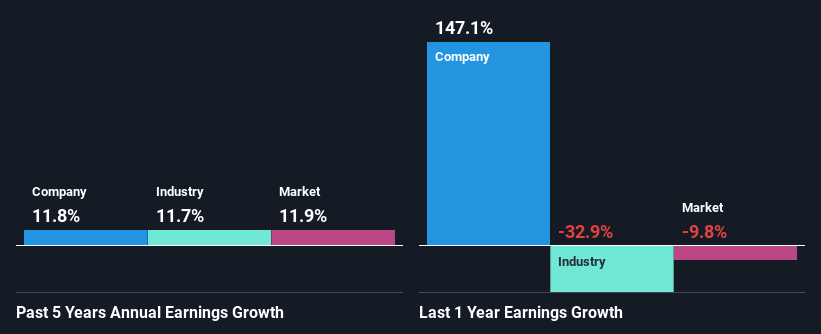Siemens Aktiengesellschaft's (ETR:SIE) Stock Is Going Strong: Is the Market Following Fundamentals?
Most readers would already be aware that Siemens' (ETR:SIE) stock increased significantly by 14% over the past three months. Given the company's impressive performance, we decided to study its financial indicators more closely as a company's financial health over the long-term usually dictates market outcomes. Specifically, we decided to study Siemens' ROE in this article.
Return on equity or ROE is a key measure used to assess how efficiently a company's management is utilizing the company's capital. Simply put, it is used to assess the profitability of a company in relation to its equity capital.
See our latest analysis for Siemens
How Is ROE Calculated?
Return on equity can be calculated by using the formula:
Return on Equity = Net Profit (from continuing operations) ÷ Shareholders' Equity
So, based on the above formula, the ROE for Siemens is:
19% = €9.4b ÷ €51b (Based on the trailing twelve months to December 2023).
The 'return' refers to a company's earnings over the last year. Another way to think of that is that for every €1 worth of equity, the company was able to earn €0.19 in profit.
Why Is ROE Important For Earnings Growth?
So far, we've learned that ROE is a measure of a company's profitability. Based on how much of its profits the company chooses to reinvest or "retain", we are then able to evaluate a company's future ability to generate profits. Generally speaking, other things being equal, firms with a high return on equity and profit retention, have a higher growth rate than firms that don’t share these attributes.
Siemens' Earnings Growth And 19% ROE
To begin with, Siemens seems to have a respectable ROE. Especially when compared to the industry average of 8.9% the company's ROE looks pretty impressive. Probably as a result of this, Siemens was able to see a decent growth of 12% over the last five years.
We then performed a comparison between Siemens' net income growth with the industry, which revealed that the company's growth is similar to the average industry growth of 12% in the same 5-year period.
Earnings growth is a huge factor in stock valuation. It’s important for an investor to know whether the market has priced in the company's expected earnings growth (or decline). Doing so will help them establish if the stock's future looks promising or ominous. What is SIE worth today? The intrinsic value infographic in our free research report helps visualize whether SIE is currently mispriced by the market.
Is Siemens Using Its Retained Earnings Effectively?
Siemens has a significant three-year median payout ratio of 61%, meaning that it is left with only 39% to reinvest into its business. This implies that the company has been able to achieve decent earnings growth despite returning most of its profits to shareholders.
Besides, Siemens has been paying dividends for at least ten years or more. This shows that the company is committed to sharing profits with its shareholders. Our latest analyst data shows that the future payout ratio of the company is expected to drop to 45% over the next three years. However, the company's ROE is not expected to change by much despite the lower expected payout ratio.
Conclusion
On the whole, we feel that Siemens' performance has been quite good. Especially the high ROE, Which has contributed to the impressive growth seen in earnings. Despite the company reinvesting only a small portion of its profits, it still has managed to grow its earnings so that is appreciable. That being so, a study of the latest analyst forecasts show that the company is expected to see a slowdown in its future earnings growth. Are these analysts expectations based on the broad expectations for the industry, or on the company's fundamentals? Click here to be taken to our analyst's forecasts page for the company.
Have feedback on this article? Concerned about the content? Get in touch with us directly. Alternatively, email editorial-team (at) simplywallst.com.
This article by Simply Wall St is general in nature. We provide commentary based on historical data and analyst forecasts only using an unbiased methodology and our articles are not intended to be financial advice. It does not constitute a recommendation to buy or sell any stock, and does not take account of your objectives, or your financial situation. We aim to bring you long-term focused analysis driven by fundamental data. Note that our analysis may not factor in the latest price-sensitive company announcements or qualitative material. Simply Wall St has no position in any stocks mentioned.

